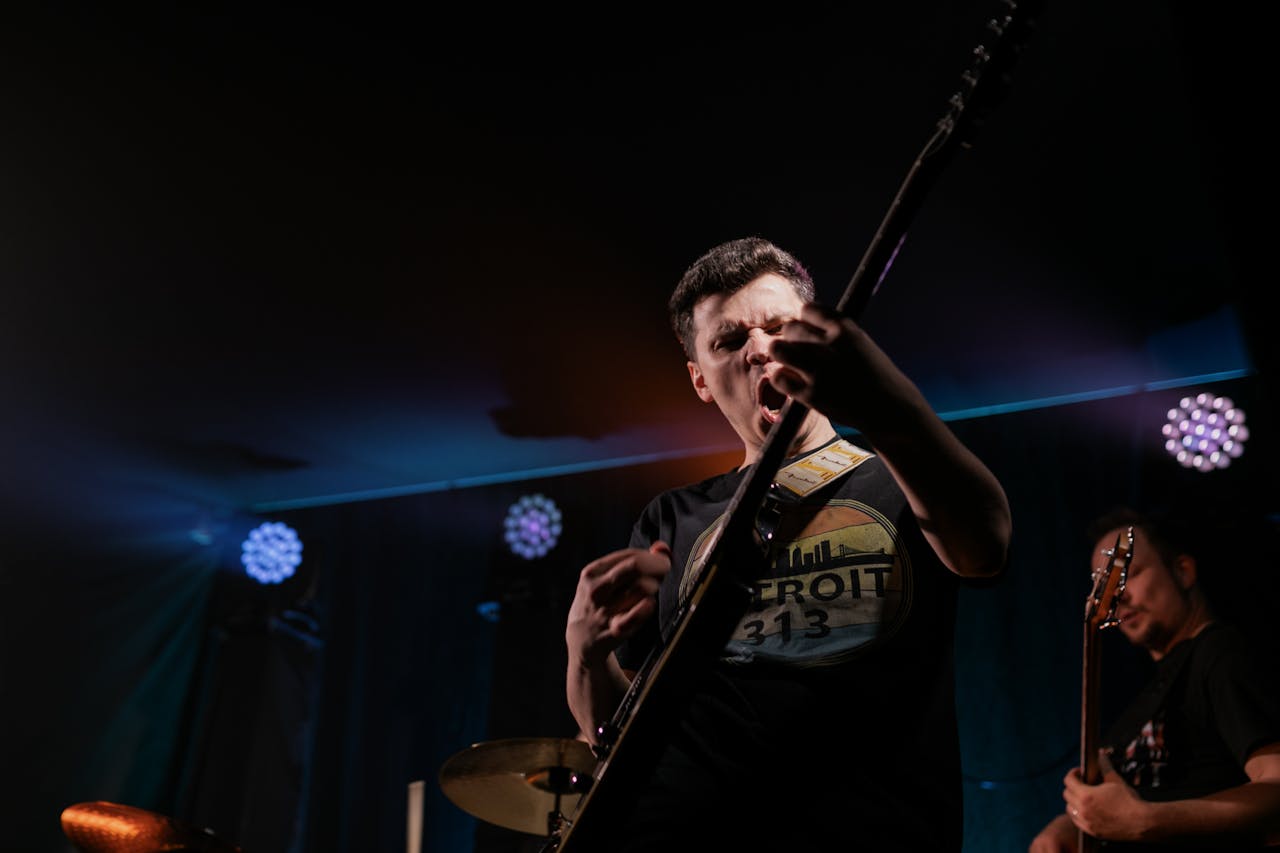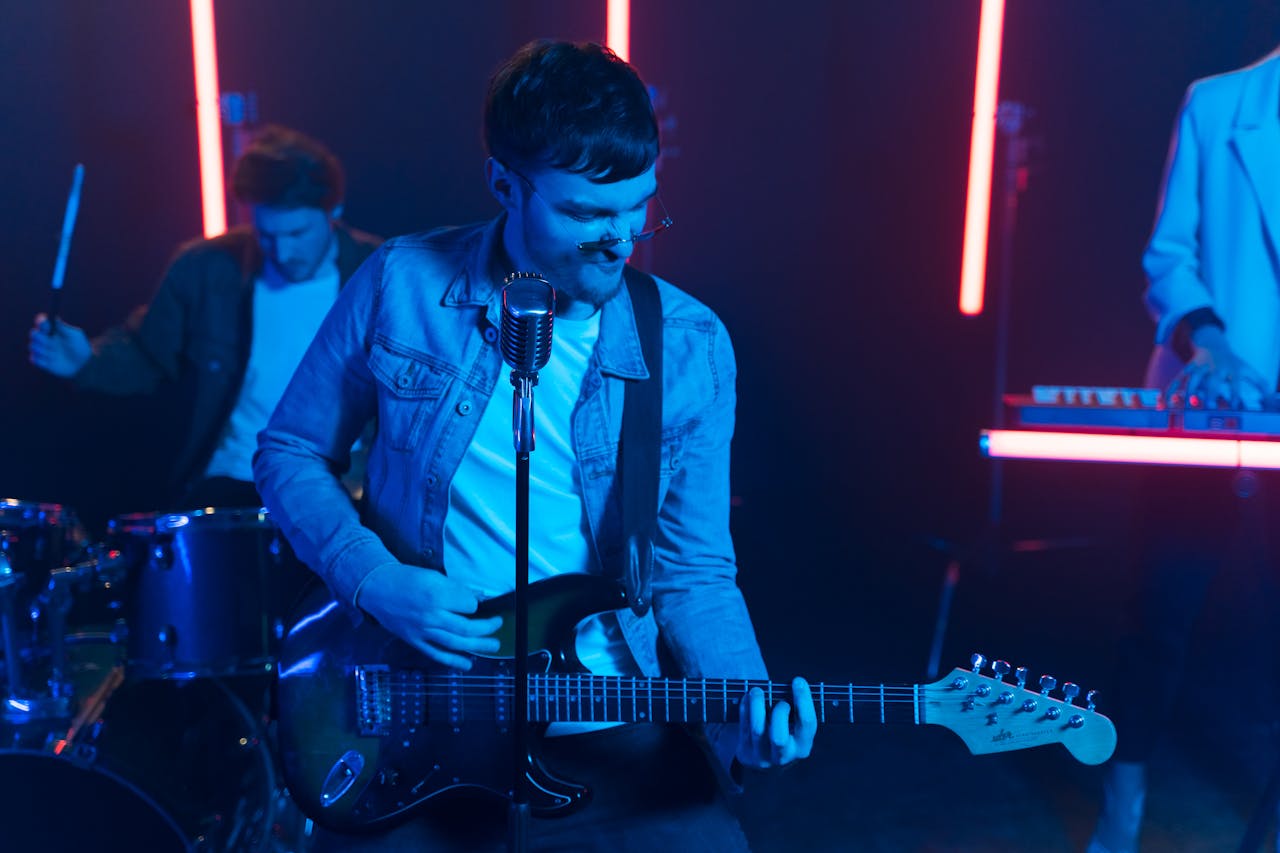A Band Born from Fear
Stage Fright’s story begins with its aptly chosen name. Lead singer Jake Rivers struggled with crippling stage fright during his high school years. He would freeze in front of crowds, his voice shaky and his hands trembling. Rather than hide from it, Jake decided to confront his fear head-on by forming a band. Joining him were guitarist Emma “Em” Frost, bassist Dylan Hart, and drummer Noah Vega—each of them outcasts in their own right but united by their love of music.
“The idea was simple,” Jake recalls. “If fear was going to rule me, then I had to make peace with it. And what better way than to put it in the spotlight?”
Their first practice sessions were rough. Songs would fall apart halfway through, and the band often found themselves questioning if they had what it took to succeed. But their determination outweighed their doubts, and over time, they developed a chemistry that would become their foundation.
The Birth of a Sound
Stage Fright’s early sound was raw and unpolished, blending the grunge influences of the ’90s with the soaring melodies of classic rock. Their debut album, Curtain Call, introduced the world to their powerful blend of vulnerability and grit. Tracks like “Spotlight Burn” and “Falling Forward” quickly became fan favorites, drawing listeners who connected with the band’s honest, unfiltered approach.
“We didn’t care about being perfect,” Em says. “We just wanted to be real. People can feel when you’re being authentic, and that’s what we aimed for.”
The album’s modest success earned the band a small but loyal following, paving the way for bigger opportunities. They began playing larger venues and opening for established acts, slowly building momentum.
From Vulnerability to Boldness: The Midnight Rebellion Era
Stage Fright’s second album, Phantom Echoes, marked a turning point for the band. With more refined production and deeper lyrical themes, the album explored the shadows of self-doubt and the lingering echoes of past mistakes. However, it was their third album, Midnight Rebellion, that truly catapulted them into the mainstream.
“Midnight Rebellion was all about finding your voice and refusing to back down,” Dylan explains. “It was us saying, ‘We’re here, and we’re not going anywhere.’”
The album featured anthems like “Break the Chains” and “No Apologies,” tracks that inspired fans to embrace their individuality and fight for their dreams. The accompanying tour was a whirlwind of sold-out shows, raucous crowds, and unforgettable moments, solidifying Stage Fright’s reputation as one of the most dynamic live acts in rock.
Experimentation and Growth
With success came the freedom to experiment, and Stage Fright embraced it wholeheartedly. Their fourth album, Neon Paranoia, was a bold departure from their earlier work, incorporating electronic elements and exploring themes of digital overload and fractured realities. Songs like “Hologram Heart” and “Artificial Nights” showcased a band unafraid to take risks.
“We didn’t want to get stuck doing the same thing over and over,” Noah says. “Growth is scary, but it’s also necessary.”
While Neon Paranoia received mixed reactions from fans, it demonstrated the band’s versatility and commitment to pushing boundaries. The album’s experimental nature also laid the groundwork for their next project, which would take them back to their roots while exploring new creative heights.
A Legacy of Fearless Creativity
Stage Fright’s fifth album, Ashes and Anthems, was a deeply personal exploration of loss, resilience, and rebirth. It balanced soaring ballads like “Phoenix Rising” with hard-hitting tracks like “Crumble to Dust.” Critics hailed it as their most mature work to date, and fans connected with its themes of hope and renewal.
Now, with whispers of a sixth album on the horizon, Stage Fright is poised to continue their legacy of fearless creativity. Rumored to be titled Eternal Spotlight, the album is expected to reflect on the band’s journey so far while looking ahead to the future.
“We’ve been through a lot as a band,” Jake says. “But every challenge has made us stronger. Fear doesn’t control us anymore; it fuels us.”
What Keeps Them Going?
When asked what drives them, the members of Stage Fright all point to one thing: connection.
“Music brings people together,” Em says. “Whether it’s a packed stadium or a single fan telling us our songs helped them through something, that connection is everything.”
For Stage Fright, fear may have been the catalyst, but it’s their unwavering passion and determination that keep the fire burning. As they prepare for their next chapter, one thing is clear: this band isn’t just surviving the spotlight—they’re owning it.



